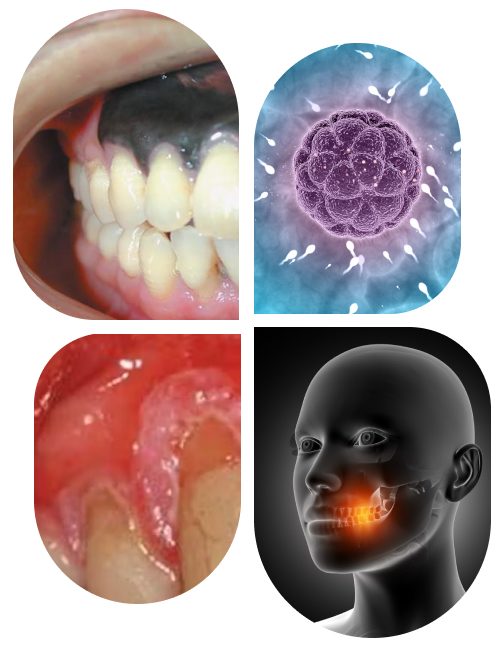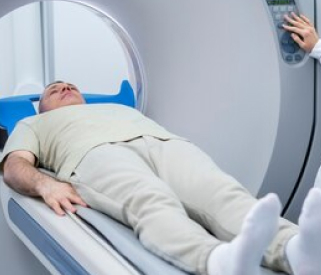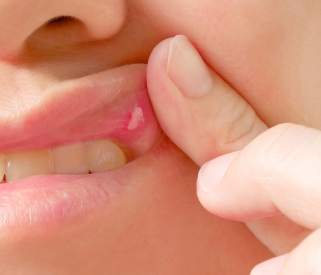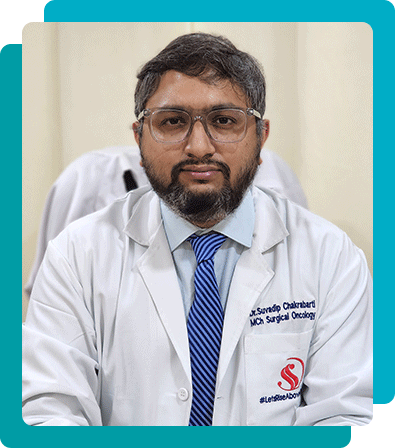Oral Cavity Cancer Surgeon in Kolkata
Dr. Suvadip Chakrabarti

What is Oral Cavity Cancer?
Early detection is crucial as oral cancer is easily treatable in its early stages. Regular dental check-ups and self-exams can help identify potential issues early on.
Types of Oral Cavity Cancer
Oral cancer types include the following.
- Squamous Cell Carcinoma (SCC)
- Oral Melanoma
- Salivary Gland Cancer
- Lymphoma
- Sarcoma
- Minor Salivary Gland Carcinoma
Symptoms of Oral Cavity Cancer
Sores that do not heal:
A sore on the lip or inside the mouth that does not heal within two weeks.
White or red patches:
These patches can be precancerous or cancerous.
Lumps or thickening:
Any unusual lumps or thickening in the mouth, lips or neck must be examined.
Difficulty chewing, swallowing, or speaking:
These symptoms may indicate an advanced stage of cancer.
Numbness or pain:
Numbness in the mouth or tongue, along with persistent pain, can be warning signs.
Loose teeth:
Unexplained loosening of teeth can be a symptom of oral cancer.
Ear pain:
In some cases, ear pain can be associated with oral cancer.
Causes of Oral Cavity Cancer
1. Tobacco Use

Smoking
Cigarettes, cigars, and pipes are major risk factors. Tobacco smoke contains carcinogens that can damage cells in the head and neck area.

Chewing Tobacco
Also known as smokeless tobacco, it is connected to cancers of the mouth and throat.
2. Excessive Alcohol Consumption

Heavy Drinking
Chronic and excessive alcohol consumption significantly increases the risk of head and neck cancers, especially when combined with tobacco use.
3. Human Papillomavirus (HPV) Infection

HPV-16 and HPV-18
These specific strains of HPV are linked to cancers of the oropharynx (the part of the throat at the back of the mouth). HPV-related head and neck cancers are often diagnosed in younger individuals and are sometimes associated with a better prognosis compared to cancers related to tobacco and alcohol.
4. Sun Exposure

UV Radiation
Extended and unprotected exposure to the sun can increase the risk of cancers on the lips and face.
5. Exposure to Certain Chemicals

Occupational Hazards
Prolonged exposure to specific chemicals, such as asbestos, formaldehyde, and certain industrial chemicals, can increase the risk of head and neck cancers.
6. Radiation Therapy

Previous Treatments:
Radiation therapy used to treat other cancers, especially in the head and neck region, can increase the risk of developing secondary cancers in these areas.
7. Poor Oral Hygiene

Chronic Irritation
Long-term irritation from poor oral hygiene or chronic gum disease can contribute to cancer risk in the oral cavity.
8. Genetic Factors

Inherited Risk
While less common, certain genetic mutations or inherited conditions may increase susceptibility to head and neck cancers.
9. Immune System Disorders

Compromised Immunity
Conditions that weaken the immune system, such as HIV/AIDS, can make individuals more susceptible to certain types of head and neck cancers.
The Stages of Oral Cavity Cancer
Stage 0: Cancer starts growing in the epithelium (outermost layer of the tissue)
Stage I: Small, localised tumour, no lymph node involvement
Stage II: Larger tumour, still localised, no lymph node involvement
Stage III: Larger tumour, or any size tumour with regional lymph node involvement, no distant spread
Treatment for Oral Cavity Cancer
How to Prevent Oral Cavity Cancer?
Quit smoking:
Staying away from tobacco products can significantly reduce your risk of oral cancer.
Limit alcohol consumption:
Excessive alcohol use raises the risk, particularly when combined with the habit of smoking.
Maintain good oral hygiene:
Brushing twice a day, flossing and dental check-ups can help prevent oral cancer.
Protect your lips:
Use sunscreen with an SPF of 30 or higher to protect your lips from sun damage.
Eat a balanced diet:
A nutritious diet full of fruits, vegetables and whole grains can keep you healthy.
Regular dental check-ups:
Early detection is crucial, so schedule regular check-ups with your dentist.
HPV vaccination:
The HPV vaccine can protect against certain kinds of oral cavity cancer.
Frequently Asked Questions (FAQs)


